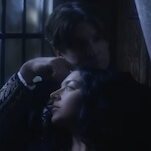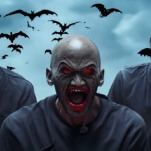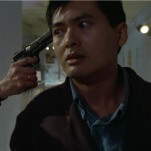The X-Men comics have remained popular and relevant for much of their 50-year history because of what their characters represent. Marvel’s mutants are a stand-in for race, religion, gender, sexual orientation, disability, or anything else that might make a person stand out as different. “Sworn to protect a world that fears and hates them,” the X-Men’s greatest enemy is often propaganda and bigotry. Mob mentality tries to squash anything outside of itself, even when that outgroup is a legion of superheroes protecting the majority’s existence. But people just want to feel accepted. Most of us desire to be part of something bigger than ourselves while remaining unique and beautiful in our own right. It’s those sort of existential dilemmas and connection to the disenfranchised that makes X-Men great, yet despite dozens of forays into video games, we’ve yet to see that human side of the comic make the trip. It might not be an X-Men game by name, but InFamous: Second Son is the closest anyone has come.
In a story that takes place seven years after InFamous 2, players take on the role of Delsin Rowe, a rebellious graffiti artist from a Native American tribe. The game is afoot when Delsin discovers his latent Conduit (read: mutant) power, the ability to copy the superhuman powers of any other Conduit he touches. When the rest of his tribe is crippled trying to protect him from a government task force, Delsin sets out to find the powers he needs to save the lives of his people. By focusing on family and shared culture, Second Son quickly establishes a stronger motivation than the previous InFamous games had. It was hard to care whether Cole MacGrath’s judgmental girlfriend lived or died or to crave the approval of his drunken lowlife best friend, Zeke. But the sweet old lady who would lie to the police for Delsin and have her brittle bones broken for it? Who wouldn’t fight for her?
Deepening the familial bonds in the game, Delsin is supported in his journey by Reggie, his older brother. As the local sheriff, Reggie spends more time arresting his delinquent brother than bonding with him, but when Delsin is scared about the uncontrollable changes coming his way, it’s Reggie who puts everything aside to protect his baby brother. Reggie acts as the lens through which we see the way society has changed since the last game. He seems like a decent guy, quick to help anyone in need and able to put up with his brother’s attitude, but he also judges everyone with powers as a dangerous criminal who needs to be caged. It’s Reggie that shows us the depth of the xenophobia that has swept across the populous over the preceding seven years.
When Delsin gets excited about a new set of powers he’s acquired from some other Conduit, Reggie cuts him off to remind him that this is an “affliction, not gift.” All Reggie wants, more than to help his tribe back home, is a cure for his sick brother. To him, and to most of society, being a Conduit is wrong. When he chides Delsin, it sounds a lot like Iceman’s mother in the second X-Men movie when she asks, “Have you tried not being a mutant?” That line is so unctuous and full of disappointment that you might forget how homophobic it sounds. Reggie loves his brother unconditionally, and he’ll stick by his side through the worst of times, but society has programmed him to believe that what Delsin has become is empirically wrong, and that’s a tough belief to disregard.
Indeed, every Conduit who Delsin meets in his adventure has some family-related sob story to motivate their actions. Each tale of sorrow loops in other hot-button issues like drug abuse and bullying for good measure. These are people whose lives would be torturous even without superpowers, suffering alone and lashing out at those who they feel have wronged them. It’s up to Delsin and the player to redeem or corrupt these unfortunate outcasts, forming his own unlikely family unit in the process. Whichever choice Delsin makes, he’ll still get some pretty cool new powers out of the deal.
And outside of the strong family and xenophobia elements, it’s the new powers that make Second Son stand out in the series. The Assassin’s Creed-like focus on parkour has disappeared in favor of thrilling new kinds of movement that are unique to each set of powers Delsin absorbs. Climbing buildings is not the most efficient tactic when Delsin can shoot across their surfaces as a bolt of light or take off like a rocket from one building to the next. Getting comfortable with new powers is simple enough—each power has roughly equivalent moves mapped to the same buttons—but there’s an elegant challenge in sizing up a situation and thinking about which power is right for the job. Maybe some invisibility would come in handy against that group of thugs, or possibly a widespread stun attack? There is no right or wrong. It’s your choice.
And choice has been a focus of the InFamous games from the very beginning—the player’s choice to be a benevolent hero or a sadistic bastard. InFamous director Nate Fox explained [note: discussion of the InFamous 2 ending in that link—ed.] that most players chose to be good guys last time, but it’s easy to see the temptation to be bad in Second Son. The villains might have crippled a sweet old lady, but then there are also the hate-filled protesters lining the city streets. They taunt passersby with the hostile chant “Get tested! What are you afraid of?!” and puff their chests to hide their fear. It does sometimes seem like a good idea to shut them up. And nobody calls your kind “Conduits” anymore, opting instead for the pejorative slur “Bio-Terrorist.” It’s hard not to think of post-9/11 America, when many Muslim-Americans were labeled “extremists” and treated with suspicion among the public and in the media.
The only area where Second Son fails to match the relevance of the X-Men is in its lack of subtlety. The major karmic choice moments always boil down to “do the right thing” or “be a total dick,” with no margin in between. When the game wants the player to feel sad or angry, it hammers those beats as hard as it can to ensure there’s no confusion. It’s impossible to sympathize with the dopily named Department Of Unified Protection (what does that even mean?), inspiring nowhere near the even-handed dread of the X-Men’s Purifiers or Friends Of Humanity. But then, the X-Men also had villains named “Holocaust” and “Orphan-Maker,” so perhaps subtlety is overrated.
Despite all of that fear and hatred, InFamous: Second Son is still a game about finding freedom by figuring out who you are. The rapid expansion of Delsin’s powers is constantly engaging, and there’s no reason to believe there couldn’t be more released later on as downloadable content. Second Son wants players to experiment and decide what kind of hero they want to be, and it gives them plenty of leeway to do so.
InFamous: Second Son
Developer: Sucker Punch Productions
Publisher: Sony Computer Entertainment
Platform: PlayStation 4
Price: $60
Rating: T







































